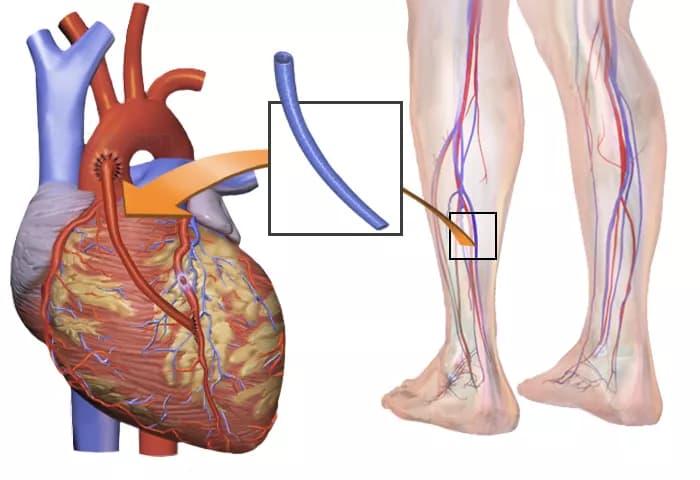
Many Good Years After Heart Bypass Surgery, But Something Happens After Ten Years
The probability of continuing your life following bypass surgery is close to being the same as for the population in general -- once the patient has completed the procedure itself. But a register study from the Department of Clinical Epidemiology at Aarhus University, Denmark, shows that mortality increases after 8-10 years.
The prognosis following heart bypass surgery is both good and has improved over the past three decades. In fact, the survival rate for bypass patients who make it through the first month after the operation is close to that of the population in general. But 8-10 years after a heart bypass operation, mortality increases by 60-80 per cent. This is new and important knowledge for the doctors who monitor these patients.
This is the main conclusion of a comprehensive national register-based study that sheds light on the thirty-year prognosis following a heart bypass operation, which has just been published by the Department of Clinical Epidemiology under the Department of Clinical Medicine at Aarhus University. The basis for the study is all of the approx. 51,000 Danish patients who have undergone surgery in the period 1980 -- 2009. They have subsequently been correlated with a control group of 500,000 people of the same age and gender drawn at random from the general population.
"The study shows that the rate of survival has improved over the last three decades, so that the probability of continuing your life following bypass surgery is close to being the same as in the general population. This holds true providing that the patient has successful surgery and for the eight-ten years after the surgery. However, after this point the prognosis changes," says medical doctor and PhD student Kasper Adelborg from the Department of Clinical Epidemiology.
Kasper Adelborg is the primary author of the publication 'Thirty-Year Mortality After Coronary Artery Bypass Graft Surgery. A Danish Nationwide Population-Based Cohort Study', which has recently been published in the American journal Circulation: Cardiovascular Quality and Outcomes.
The study shows that ten-year-survivors have an increased mortality of between 60 and 80 per cent when compared with the general population. This may be due to the fact that the disease is progressive and that the atherosclerosis or hardening of the arteries increases, or that the implanted material begins to fail.
"Our register study covers all patients who underwent bypass surgery throughout the last decades throughout Denmark, and there will naturally be differences in the prognosis from patient to patient. So the clinicians who are in contact with the patients should therefore assess their prognosis individually -- and there are special reasons to do this after the initial eight -ten years, as we now know that 'something' happens," says Kasper Adelborg about the perspectives of the study, which is currently being tweeted all over the world -- and which has triggered a personal email to Kasper Adelborg from the journal's chief editor, who is impressed by the possibilities for studying long-term prognosis following heart bypass surgery using high quality data.
"Of course, this has to do with the fact that we in Denmark have unique opportunities to link register information from the registries. When we work with a control group of half a million Danes, we have the possibility of directly comparing the prognosis for a 55-year-old man who has undergone bypass surgery with a 55-year-old man who has not had surgery from the control group," explains Kasper Adelborg.
"It may be that we see this as an obvious correlation to make in Denmark, but the fact is that we in Denmark keep such good track of our citizens that many other countries envy us. In other places such as the US, it is not possible to simply extract information about when people have undergone surgery or died. This is information which is not centrally registered and which can therefore be lost if, for example, someone moves to a different region or state," says Kasper Adelborg.
In addition to the new knowledge about a special 'period of attention' 8-10 years after the bypass surgery, the first month is particularly critical.
Within the first 30 days after bypass surgery, patients have an increased risk of dying in connection with the operation, which is not in itself new.
"It is well-known that there are risks associated with a complicated operation in the heart, but fortunately mortality in connection with the surgery itself is quite low. What is new is that we have precise figures for the prognosis, including the long-term prognosis for patients who have undergone bypass surgery, compared with the rest of the population," says Kasper Adelborg.
Materials provided by Aarhus University. Note: Content may be edited for style and length.
Disclaimer: DoveMed is not responsible for the accuracy of the adapted version of news releases posted to DoveMed by contributing universities and institutions.
Primary Resource:
Adelborg, K., Horváth-Puhó, E., Schmidt, M., Munch, T., Pedersen, L., Nielsen, P. H., ... & Sørensen, H. T. (2017). Thirty-Year Mortality After Coronary Artery Bypass Graft Surgery. Circulation: Cardiovascular Quality and Outcomes, 10(5), e002708. DOI: 10.1161/CIRCOUTCOMES.116.002708
Related Articles
Test Your Knowledge
Asked by users
Related Centers
Related Specialties
Related Physicians
Related Procedures
Related Resources
Join DoveHubs
and connect with fellow professionals

0 Comments
Please log in to post a comment.